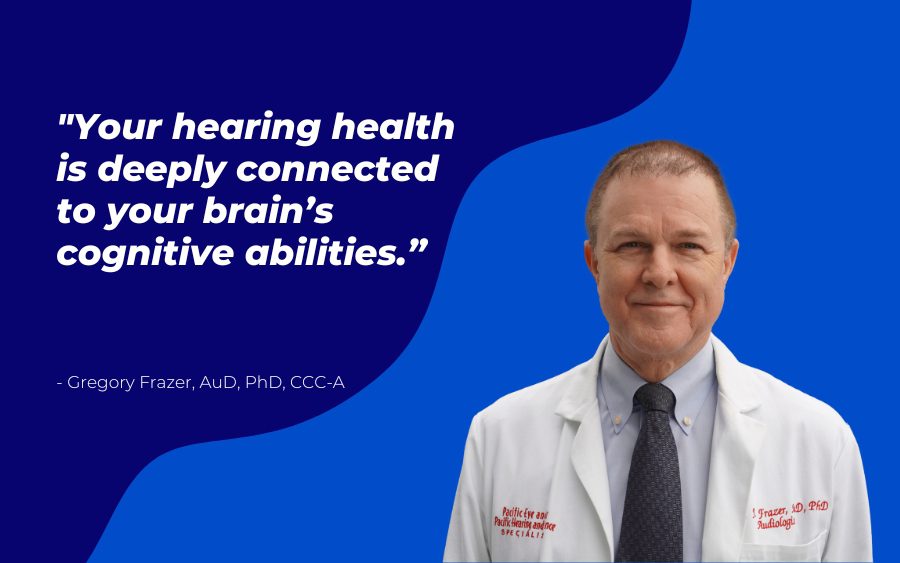As we age, maintaining cognitive fitness becomes increasingly important for our overall well-being. Healthy hearing is deeply connected to your brain’s health and function. That’s why nurturing cognitive fitness should be a part of your hearing health journey.
Inspired by insights from Harvard Health Publishing’s Cognitive Fitness Program, we’ll explore six essential steps you can take to boost your cognitive health and improve your brain’s ability to learn, understand, and remember well into your golden years.
1. Enjoy a Brain-Healthy Diet
What you eat plays a crucial role in protecting your brain from cognitive decline. Studies show that plant-based foods, rich in antioxidants, vitamins, and omega-3 fatty acids, can help reduce the risk of Alzheimer’s disease by up to 53 percent. Foods such as leafy greens, berries, nuts, and fatty fish (like salmon) are particularly beneficial.
The flexibility of a brain-healthy diet allows you to enjoy a wide variety of foods while focusing on nutrients that support cognitive function. Avoiding processed foods and excessive sugar intake is also key to long-term brain health.
2. Incorporate Brain-Healthy Exercise
Physical activity doesn’t just strengthen your muscles; it also enhances your brain. Research shows that individuals who exercise regularly have a lower risk of developing dementia and perform better on memory and cognitive tests. Exercise improves blood flow to the brain, stimulating the growth of new brain cells and connections.
Incorporate a combination of aerobic exercises, strength training, and mind-body practices like yoga or tai chi. These activities not only support cognitive function but can also improve balance, which is important, as hearing plays a crucial role in maintaining balance and coordination.
3. Prioritize Brain-Healthy Sleep
Sleep is the brain’s natural repair process, critical for consolidating memories and supporting overall cognitive function. A lack of sleep can impair your memory and ability to focus. Ensure you get seven to nine hours of quality sleep each night. If you struggle with sleep, try techniques like setting a consistent bedtime, creating a relaxing sleep environment, and limiting caffeine intake in the afternoon.
Sleep is also essential for hearing health—studies suggest that untreated hearing loss can contribute to sleep disturbances, so ensuring your hearing is in check is a key part of a healthy sleep routine.
4. Practice Brain-Healthy Stress Management
Chronic stress is damaging to the brain, leading to memory problems and cognitive decline over time. The good news is that practicing stress management techniques, such as mindfulness, meditation, deep-breathing exercises, and even regular physical activity, can significantly reduce stress levels and protect your brain.
Additionally, maintaining a healthy gut can positively impact your stress levels and mental well-being. There is a strong gut-brain connection, and taking care of your digestive health through a balanced diet can alleviate stress and improve cognitive function.
5. Foster Brain-Healthy Relationships
Strong social connections are vital for maintaining cognitive fitness. Engaging with friends and family, participating in group activities, or joining clubs can all help sharpen your mind and protect against memory loss. Regular social interaction helps keep your brain active, which may delay or even prevent cognitive decline.
Being socially engaged also helps combat isolation, which can lead to loneliness—a condition that increases the risk of dementia. Nurturing meaningful relationships can improve your overall well-being, including your emotional and cognitive health.
6. Engage in Brain-Healthy Challenges
Mental stimulation is essential for keeping your brain sharp. Whether it’s solving puzzles, learning new skills, or engaging in creative activities, regularly challenging your brain strengthens its ability to process and retain information. Evidence shows that consistent mental exercise can slow down memory decline and even prevent certain cognitive disorders.
Incorporate activities like crossword puzzles, brain-training apps, or reading new books into your daily routine to give your brain a healthy workout.
The Connection Between Hearing Health and Cognitive Fitness
Your hearing health is deeply connected to your brain’s cognitive abilities. Untreated hearing loss can contribute to social withdrawal, stress, and cognitive decline. As part of your cognitive fitness journey, we encourage regular hearing assessments to ensure your brain receives the full range of sounds needed for mental stimulation and communication.
By adopting these six steps, you can protect your brain, enhance your hearing, and ensure a sharper, healthier future.
Ready to Improve Your Cognitive Fitness?
If you’re interested in learning more about how improving your hearing can boost your cognitive health, schedule a hearing assessment with Pacific Hearing Inc. today. Our team is here to guide you through the process and provide personalized recommendations to enhance both your hearing and cognitive well-being.
Call us at (310) 909-0180 or use our contact page to schedule an appointment.





